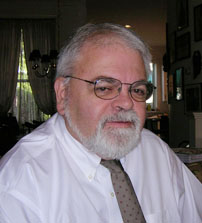The Ford Institute for Human Security Celebrates its 10th Anniversary and Partnership with the Global Studies Center
By Louis Picard
 |
|
Dr. Louis Picard |
As the Ford Institute for Human Security celebrates its 10th anniversary, we reflect on the years of collaboration with the Global Studies Center. Throughout the past decade, the Global Studies Center has served as a valued partner in the examination of transnational issues related to human security and the societal responses to threats toward vulnerable individuals and communities that face conflict and deprivation.
The Global Studies Center has supported Ford Institute research efforts on human security through Global Academic Partnership (GAP) conference grants, which bridge academic institutions abroad with the University. Ford has benefited from the support of two GAP Grants, focused on governance and sustainable development in Africa and children at risk in conflict. Global Studies has also supported efforts to connect students with visiting professionals and scholars, conduct research on policy-relevant topics, and improve curriculum for students studying human security.
Achieving development in Africa requires sustainable solutions that rely on improved conditions of governance for underperforming countries on the continent. In 2012, Global Studies Center supported a GAP- funded international conference that focused on Achieving Sustainable Development in Africa, awarded to current Ford Director Louis A. Picard. Outcomes from the conference included: 20 academic and policy papers on issues relating to sustainability, governance, and human security in Africa; the creation of a network of scholars focused on sustainability issues in Africa, particularly as they relate to governance; and the forthcoming edited volume: Sustainable Development and Human Security in Africa: Governance as the Missing Link on CRC/ Taylor and Francis Press.
The GAP-funded conference on States at Risk: Building Knowledge About Children in Armed Conflict, which was awarded to then-Ford Director Simon Reich, yielded thirteen academic and policy papers on child soldiering in states at risk, which led to the development of a large scale, multi-year research project investigating different aspects of child soldiers in relation to civil and ethnic conflict and to terrorism within states at risk. This resulted in the creation of the “Child Soldiers Initiative” (CSI), which was composed of a cross-section of policymakers and academics, with the goal of generating greater understanding of the issues, and the development of innovative policy proposals and solutions intended to reduce the number of child soldiers. Proceedings from the conference led to an edited volume:Child Soldiers: Children and Armed Conflict in the Age of Fractured States on the University of Pittsburgh Press.
GSPIA students benefited from a new course developed by Simon Reich and offered in fall, 2007 entitled Human Security Capstone Freedom from Fear: Direct Threats to Civilian Populations; and a student exchange program between the University of Pittsburgh and the International Peace Research Institute of Oslo.
The conference also helped initiate a dialogue with the policy community through the exploration of the question of what makes a camp safe. Research from the conference contributed to attracting a grant from the Human Security Program of the Canadian government’s Department of Foreign Affairs and International Trade to initiate a long-term research project on the protection of children from abduction as child soldiers in IDP and refugee camps. The project involved the coding of over 1,000 camps in six African conflicts in the last decade to evaluate the drivers of camp safety.
In recent years, the Global Studies Center has provided support for the development of career, research, and curriculum efforts at the Ford Institute, including support of its speaker series, and research on civilian casualties and marginalized peoples.
The Global Studies Center collaborated with the Ford Institute on a discussion series that connects undergraduate students with scholars and policy researchers that visit the Ford Institute. This permitted the Ford Institute to host Princeton N. Lyman, current Senior Adviser to the President of the United States Institute for Peace and former United States Special Envoy for Sudan and South Sudan (March 2011-13), and Dr. Dina El Naggar, Senior External Affairs & Outreach Officer at the Integrity Vice Presidency in the World Bank. This series allows students to network with and learn about the career experience of Ford speakers to better understand their professional options after graduation.
In order to better train graduate students in project assessment skills, the Global Studies Center supported Ford efforts through graduate student research to assist in the preparation of a curriculum for a field-based course on project monitoring and evaluation for GSPIA students. This course focuses on Human Security themes in the assessment of international development projects, particularly those intended to ameliorate the effects of man-made crises relating to armed groups in Uganda and HIV/AIDS. The course also supports the Global Societies theme as students learn project appraisal techniques to support civil society initiatives in these fields and apply sustainability techniques to nongovernmental organization operations.
Understanding conditions of marginality and improving government policy responses requires comparative investigation of where successes and failures have occurred. The Global Studies Center supported graduate student assistance and field research in Soroti, Uganda that led to the construction of a conceptual framework to examine marginalized peoples and investigation through a governance, human rights, and property rights approach. This initiative brought together a roundtable of twelve academics and policy researchers with diverse interests, including Dr. Nancy Condee, GSC Director and Dr. Thomas Allen, GSC Associate Director. Comments from this effort helped to develop a concept paper: “Mapping Marginality: A Marginalized Peoples Research Project” on the pastoral people of Northern Kenya and Uganda, the Roma of Southeast Europe, the San and Nama of Southern Africa, and the Tuareg people of the Sahel region of Africa; and enabled the Ford Institute to seek external funding for the project.
Current and future Ford Institute efforts will focus on governance, human rights, and political violence. As the Ford Institute extends its work in these areas, partnership with the Global Studies Center will lead to continued collaboration to promote responses to these issues in a changing world.
